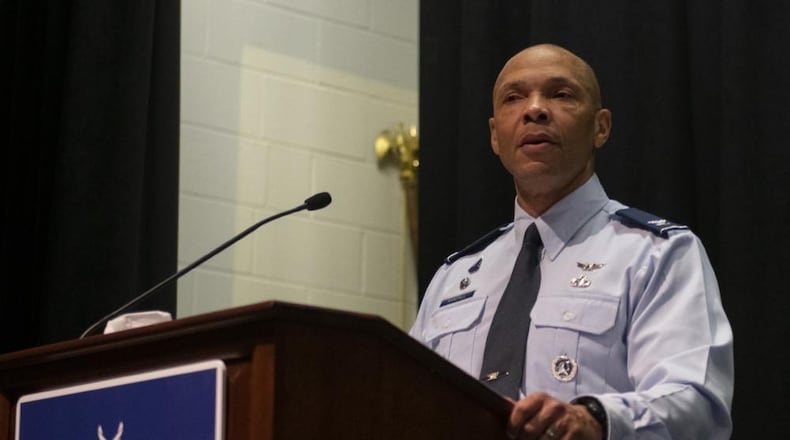Their work has resulted in economic sanctions, diplomatic démarches and memos to the president, said Randall, first commander of NSIC, which was stood up last June in a ceremony at Wright State University’s Ervin Nutter Center.
“Be proud of your Guardians,” Randall told the gathering at the Hilton Garden Inn, eight months to the day he assumed command.
NSIC or “Space Delta 18″ — identified as the 18th member of the federal intelligence community — delivers scientific and technical intelligence to help national leaders and warfighters act in the realm of space.
Space Delta 18 was activated with two squadrons shifted from NASIC. Both NSIC and NASIC are intelligence-gathering organizations of national import.
“We have two three-letter agencies in our very own backyard,” said Elaine Bryant, the Dayton Development Coalition’s executive vice president, aerospace and defense, comparing NASIC and NSIC to the CIA and similar agencies. Bryant herself, a retired Air Force officer, has worked for NASIC.
Randall formerly served as the chief, Intelligence, Surveillance, Reconnaissance (ISR), for Space Force at the Pentagon. He said Friday that Wright-Patterson — with well over 30,000 military and civilian employees — is home already to anywhere from a third to a half of the Space Force’s entire ISR enterprise.
While NSIC has just under 400 employees, the much older NASIC —with roots in Wright-Patterson’s Air Technical Intelligence Center and Foreign Technology Division — has some 4,000.
With relatively few people, Delta 18 helps monitor China’s 700-plus satellites, including the 100 or so launches in the past year, Randall said. The three-year-old Space Force was watching as Russia blew up one of its own satellites in late 2021. And NASIC and NSIC help watch the Russian war in Ukraine.
“For the past six months, it has been controlled chaos, to be honest with you,” Randall said.
NSIC’s charge from National Intelligence Director Avril Haines was the consolidation, ultimately, of all space intelligence focus areas, Randall said.
“There is going to be ongoing discussions as to what space intelligence or space-related intelligence functions in other places may eventually get integrated into the center,” he said. “Some may be fully (integrated), some may be partially, some may very well not be at all. It’s what makes sense for our nation.
“Those conversations have started. There have been no decisions made,” he added.
Delta 18 and Space Force guard the constellation of satellites that make possible the global positioning system on which we all rely for commerce and pleasure, Randall said.
“Guess what? Without that constellation, you and I are lost every day,” Randall said.
In general, Delta 18 and NASIC are charged with monitoring what objects are going up, what those objects are doing and with what intentions, he said.
When questioned sometimes about why the nation needs a military branch devoted to space, Randall said his response is: “Why not a Space Force? Space is vital to everyone.”
Last June, officials said 345 uniformed and civilian NSIC employees will continue to work with NASIC. In fact, many employees reassigned to NSIC from NASIC will continue their duties at their same desks, a Space Force spokeswoman told the Dayton Daily News last June.
About the Author


